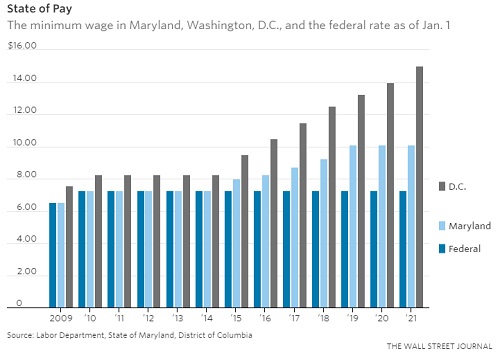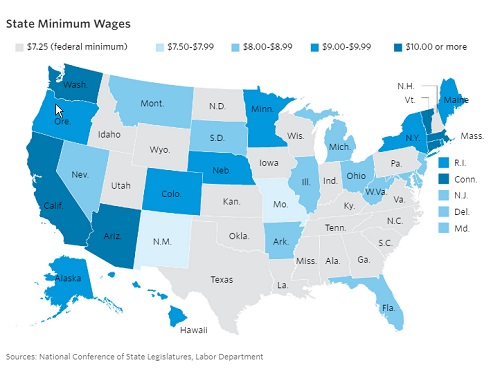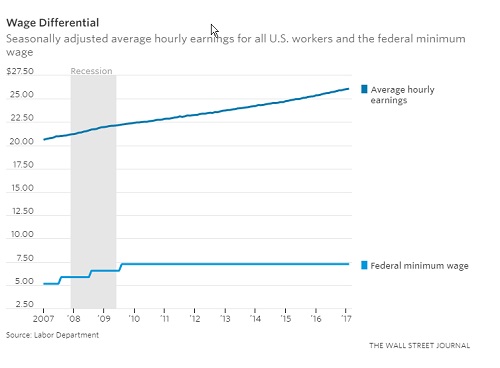Cities and counties from
Portland, Maine, to Los Angeles have successfully passed local minimum-wage
increases, but recent resistance in seemingly friendly territory suggests a
momentum shift.
The newly elected Baltimore mayor
last month vetoed an increase of the local wage floor to $15 an hour by 2022,
despite favoring the policy as a candidate. Earlier this year, the top elected
official in Montgomery County, Md., outside Washington blocked a similar
measure despite the county previously being at the forefront of local
minimum-wage increases.
“I want people to earn better
wages,” Baltimore Mayor Catherine Pugh, a Democrat, said in an interview. “But
I also want my city to survive.”
Proponents view increases as a
way to ensure low-wage workers earn incomes above the poverty line, and to
narrow the disparity between rich and poor Americans. Opponents say raising the
minimum wage discourages hiring and encourages employers to invest in
automation or move jobs to lower-wage states or countries.

The federal minimum wage of $7.25
an hour is set by Congress. It hasn’t increased since 2009. The average hourly
wage of U.S. workers has increased by almost $4 an hour, or 18%, since the last
federal increase, according to the Labor Department.
Emily Bruno, founder of Silver
Spring, Md.-based Denizens Brewing Co., said a minimum-wage increase would
disproportionately hurt the local businesses that Montgomery County officials
often tout, because small firms have less ability to absorb large cost increases
than national chains do.
An increase to $15 an hour would
raise her labor costs by $300,000 a year, nearly equal to the brewery’s annual
profit, she said.
“My employees are like family, I
want to pay them as much as I can,” Ms. Bruno said. “But I also need to make a
profit to remain in business.”
Lawmakers in several other states
also are pushing back against local minimum-wage increases. At least four
municipalities in Cook County, Ill., have opted out of the county government’s
move to raise the minimum wage in the Chicago suburbs to $13 an hour by 2020.
Iowa Gov. Terry Branstad, a Republican, approved legislation in March to roll
back higher minimum wages already approved in four counties. In Flagstaff,
Ariz., council members just amended a minimum-wage increase approved by voters
in November to slow the pace of increases.

Those rejections could
reinvigorate business groups that have been pushing back on a national wave of
minimum-wage increases that included California and New York establishing
an eventual $15 level.
Mike Whatley, director of state
and local government affairs at the National Restaurant Association, said
Democratic opposition to minimum-wage increases is helpful to groups like his.
“It shows their peers around the
country that they are willing to push pause and spend a little more time
considering what it will mean for their community,” he said.

Others say people shouldn’t read
too much into a few losses. Last year, 18 cities and counties and seven states
approved minimum-wage increases, according to the National Employment Law
Project, an organization that advocates for low-wage workers.
“Cities, counties and very large
states raising the minimum wage is the trend,” said NELP attorney Tsedeye
Gebreselassie. “The two vetoes are the anomaly.”
In Baltimore, supporters of the
bill say the mayor broke her promise by rejecting legislation that the City
Council approved in an 11-3 vote. Efforts by council members to override the
veto came up short. As a result, the city will continue to follow Maryland’s
statewide minimum wage, which is set to rise to $9.25 in July and to $10.10
next year.
“This was blatant, clear-cut
betrayal by an elected official,” said Mark McLaurin, political director at the
Service Employees International Union, Local 500. The union, which represents
workers in Maryland, campaigned on behalf of Ms. Pugh. Mr. McLaurin said the
larger concern is the recent actions in Maryland “give carte blanche to
Democrats across the country to give short shrift to working people.”
The mayor said she worried the
wage hike would drive private-sector jobs out of the city, where the 6.6%
unemployment rate is far higher than in surrounding counties. In addition, city
analysts estimated the bill would have raised municipal payroll costs by $115
million over four years, as the higher minimum wage was phased in.
She said she reversed her
position after hearing from some of the city’s employers.
Four hospital systems, including
Johns Hopkins, said the increase would have cost them tens of millions of
dollars. Deli meat producer Dietz & Watson, which employs about 250 workers
at a West Baltimore processing plant, threatened to move operations to
Kentucky, Ms. Pugh said. The company didn’t respond to requests for comment.
A local businessman, Ron Furman,
who runs a craft candle-making business that hires people with employment
barriers such as criminal records, told city officials that if the bill were
enacted, he would open a planned factory in neighboring Baltimore County.
“There’s a limit when you’re
trying to compete with products made in Vietnam and China,” he said.
Click
here for the original article from the Wall
Street Journal.